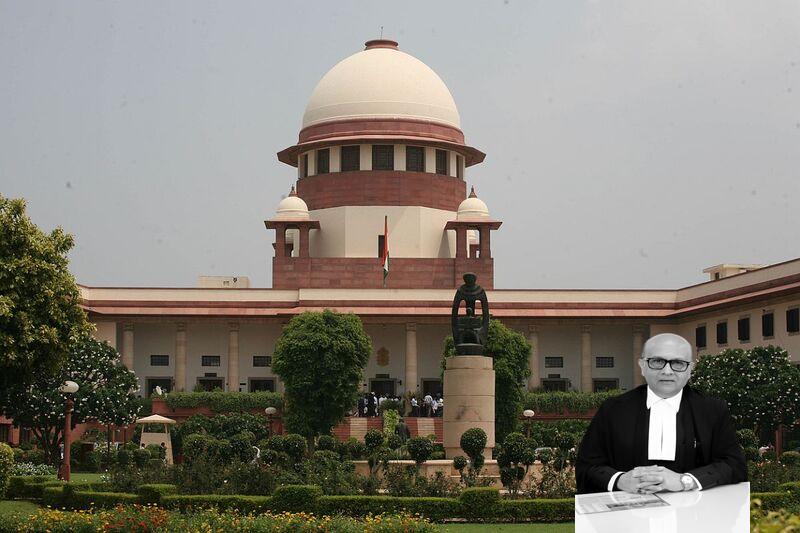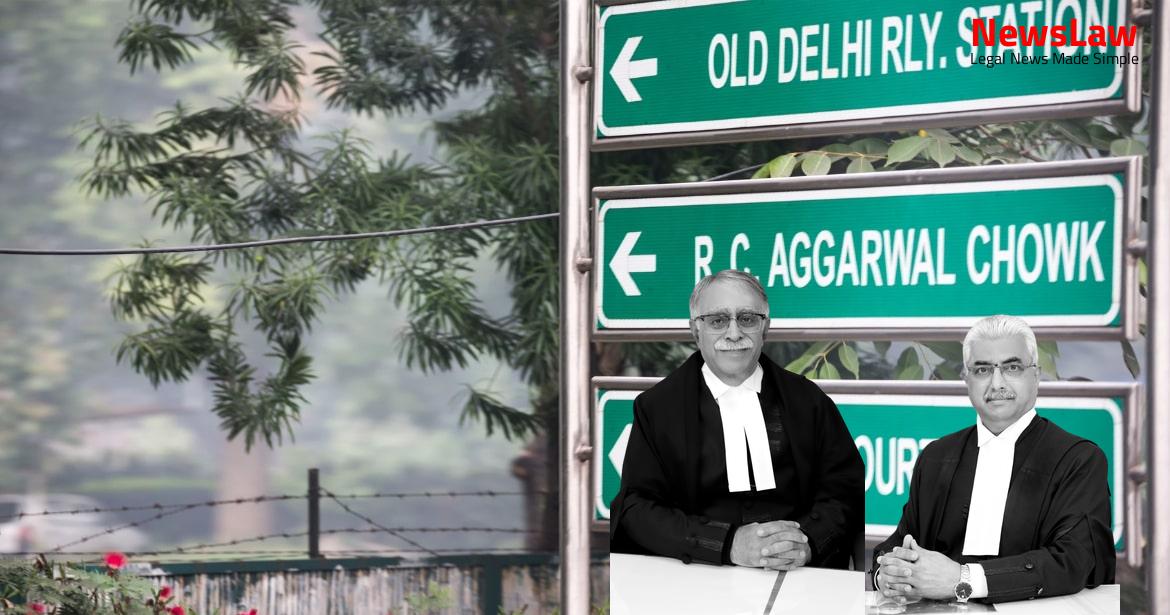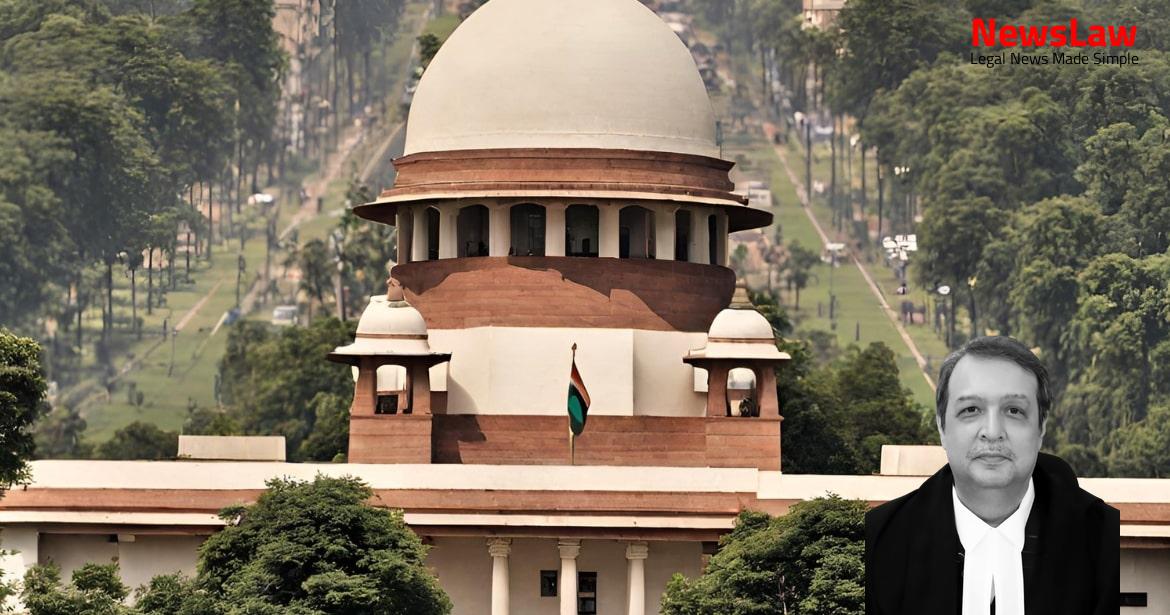In addition to the above, a direction was issued to the Competent Authority (Urban Ceiling) Saharanpur to ensure that the name of the original petitioner is restored in the revenue records. With the Urban Land (Ceiling and Regulation) Act, 1976 coming into force, proceedings thereunder were initiated against the original petitioner giving rise to Case No 2186 of 1976. The order dated 3.1.1986 is reproduced below: “This Writ Petition is against the order of the Competent Authority, Saharanpur dated 26.11.1977- The contention of the Learned counsel for the petitioner is that the impugned order is without jurisdiction and is unenforceable. Taking advantage of the observations made by the High Court in its order dated 3.1.1986, the original petitioner filed objections before the Competent Authority, which were rejected, vide order dated 27.03.1987, while observing that, — (a) 5499.29 square meter of land was declared surplus on 26.11.1977; (b) the notification under Section 10(1) was published on 09.1.1978; (c) the notification under Section 10(3) was made on 15.01.1979, (d) the appeal of the original petitioner before the District Judge was rejected on 12.07.1979; (e) the objection with regard to jurisdiction of the Competent Authority, on the ground that land is agricultural and outside the master plan, is unsustainable because, according to the report, it fell in a residential area within the purview of the Master Plan; (f) the possession of the surplus land had already been taken.
The said writ petition remained pending for over a decade and was decided on 28.02.2001, after the Repeal Act, 1999 was notified. In the year 2012 a third writ petition was filed by the first respondent claiming, inter alia, that actual possession of the surplus land was never taken; he continues to remain in possession of the land and is, therefore, entitled to a declaration that ceiling proceedings qua him stood abated by virtue of Section 4 of the Repeal Act, 1999. 1999; (v) the benefit of the Repeal Act, is not available to the petitioner. 4 of the counter affidavit, the same has been denied by the petitioner, but even assuming the same to be correct, the actual physical possession alleged to have been taken on 08.03.1979 could not be done as the period of 30 days had not expired. It is therefore evident that the case taken in the counter affidavit of having taken over the actual physical possession is not in conformity with law nor actual possession appears to have been taken.” 10. However, since the original petitioner avoided signing the memorandum of possession, the Competent Authority went to the spot, took possession in presence of two co-sharers and prepared a memorandum to that effect. (ii) The writ petition is highly belated, inasmuch as, after disposal of writ petition No. In this case, in the context of a challenge to occupation of a piece of land without lawful acquisition and payment of compensation, it was observed that remedy of the landholder is either to institute a civil suit for recovery of possession and/or for compensation, or to file a writ petition if the action can be shown to be arbitrary, irrational, unreasonable, biased, mala fide or without the authority of law, and seek a direction that the land should be acquired in a manner known to law. (ii) State of Assam vs. Bhaskar Jyoti Sarma, (supra). Assuming that a person in possession could make a grievance, no matter without much gain in the ultimate analysis, the question is whether such grievance could be made long after the alleged violation of Section 10(5). Hari Ram, (2013) 4 SCC 280 : (2013) 2 SCC (Civ) 583] considering whether the word “may” appearing in Section 10(5) gave to the competent authority the discretion to issue or not to issue a notice before taking physical possession of the land in question under Section 10(6). That is because Bhabadeb Sarma, erstwhile owner, had not made any grievance based on breach of Section 10(5) at any stage during his lifetime implying thereby that he had waived his right to do so. The principles which can be culled out from the above-noted judgments are: ( i ) No hard-and-fast rule can be laid down as to what act would constitute taking of possession of the acquired land. ( iv ) If the acquisition is of a large tract of land, it may not be possible for the Civil Appeal No 5721 of 2023 acquiring/designated authority to take physical possession of each and every parcel of the land and it will be sufficient that symbolic possession is taken by preparing appropriate document in the presence of independent witnesses and getting their signatures on such document.
The utilisation of the major portion of the acquired land for the public purpose for which it was acquired is clearly indicative of the fact that actual possession of the acquired land had been taken by BDA. Therefore, in the third round of litigation, when the original petitioner claimed that actual possession was never taken by the State, the burden was on the State to establish that possession was taken. Therefore, in absence of any concrete evidence to indicate that possession was taken in the manner permissible under Section 10(6) of the Ceiling Act, 1976, conferment of the benefit of the Repeal Act, 1999 was justified. These are: (i) On 26.11.1977, 5499.29 square meter of land of the first respondent was declared surplus by the Competent Authority under Section 8(4) of the Ceiling Act, 1976. (vi) The order dated 27.03.1987 was challenged through writ petition No 9702 of 1987 wherein, on 20.08.1987, an ex parte interim order was passed directing that the original petitioner shall not be dispossessed from the land in dispute. Although there is no hard and fast rule that a question of fact cannot be determined in writ jurisdiction but, in the event of a serious dispute between the parties on a question of fact, a writ court ordinarily refrains from deciding it. In the above backdrop, the foremost issue which arises for our consideration is: Whether in exercise of writ jurisdiction the High Court should have refrained from adjudicating the contentious issue with regard to taking of actual possession of the surplus land from the landholder, when the same was not decided in the previous round of litigation even though it had arisen for consideration? For the same reason, a suit may not lie to declare Civil Appeal No 5721 of 2023 that surplus land, which has been notified as such under Section 10 (3) of the Ceiling Act, 1976, is free from ceiling for failure to take actual possession prior to enforcement of the Repeal Act, 1999.
In view of this conditional declaration, a further declaration in respect of validity of the orders passed, and notifications issued, under the Ceiling Act, 1976, was not required, therefore a court of competent Civil Appeal No 5721 of 2023 jurisdiction could have entertained a suit and grant such relief, as may be warranted, dependent on its determination whether actual possession of the surplus land was taken or not, before the cut-off date. Bearing the aforesaid legal principles in mind, we would have to consider whether, in the facts of Civil Appeal No 5721 of 2023 the case, the High Court ought to have dismissed the third writ petition of the first respondent and relegate him to a suit as there existed a serious dispute between the parties regarding taking of possession. No doubt, in a writ proceeding between the State and a landholder, the Court can, on the basis of materials/evidence(s) placed on record, determine whether possession has been taken or not and while doing so, it may draw adverse inference against the State where the statutory mode of taking possession has not been followed [See State of UP vs. Even if we assume that the third writ petition was based on a separate cause of action, still there could have been a whisper as to what was the reason for such long delay in filing the first writ petition, particularly when the original petitioner was throughout aware of State’s case that possession had been taken in the year 1979 after publication of the vesting notification. What is even more interesting is that in the third writ petition there is no specific statement that recital in the order, dated 27.03.1987, with regard to taking of possession is incorrect.
If it were so, even if the petitioner entered into possession anytime thereafter, may be on the strength of the ex parte interim order dated 20.08.1987, the same would not defeat the right of the State in view of decision of this Court in Indore Development Authority (supra) where, in paragraph 258 of the judgment, it was held that once title of the land vests in the State, consequent to acquisition and taking of possession, even if the landholder has retained possession or otherwise trespassed upon it after possession has been taken by the State, he is just a trespasser and his possession, if any, would be on behalf of the owner i.e., the State. In these circumstances as also that no documentary evidence was filed regarding original petitioner’s possession between the years 1979 and 1987, in our view, the interim order did not carry much evidentiary value to prove that possession was not taken prior to the year 1987. In view of the discussion above and having regard to the following: (a) that there was a serious dispute with regard to taking of possession of the surplus land; (b) that there was a delay of about seven years in filing the first writ petition from the date when possession was allegedly taken by the State, after publication of the vesting notification; (c) that no documentary evidence such as a Khasra or Khatauni of the period between alleged date of taking possession and filing of the first writ petition was Civil Appeal No 5721 of 2023 filed by the original petitioner; (d) that in the earlier two rounds of litigation, the High Court refrained from deciding the issue of possession of the surplus land even though that issue had arisen directly between the parties; and (e) that infraction of the prescribed statutory procedure for taking possession cannot be the sole basis to discard State’s claim of possession, when it is stated to have been taken long before the date the issue is raised, we are of the considered view that the High Court should have refrained from deciding the issue with regard to taking of actual possession of the surplus land prior to the cut off date specified in the Repeal Act, 1999.



